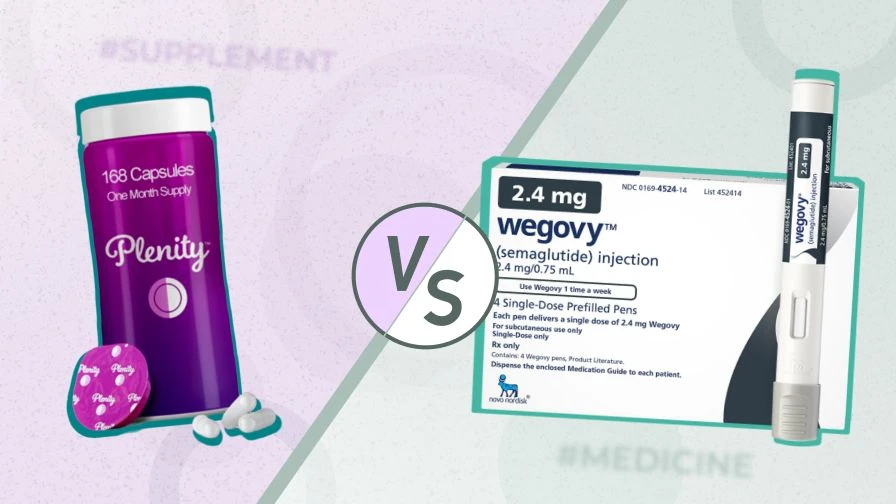Ozempic (Semaglutide) is a new drug approved in Australia in 2020 for weight loss for adults with excess weight or diagnosed obesity.
It is available in the form of an injection pen. They inject it once a week.
The primary purpose of the drug is to treat type 2 diabetes. At the same time, it helps people with this disease in weight loss. They use it with a balanced diet (more vegetables, fewer sweets, and fatty foods) and exercise.
Also, you should remember that: Ozempic doesn’t replace insulin or appetite suppressants.
Like any effective drug, Ozempic has side effects.
Ozempic can lead to hypoglycemia if you take it with other diabetes medications. Symptoms include:
- Sweating;
- Tremor, headache, or increased heart rate;
- Hunger;
- Dizziness.
As one of the Ozempic injection side effects, swelling and redness may appear at the injection point; itching may occur.
The drug manufacturer and clinical trial data give a long list of the side effects of Ozempic for weight loss.
Most often, adverse effects appear at the beginning of the course. Body reactions may include:
- Fatigue (not enough energy);
- Gassing and burping;
- Headache;
- Nausea and vomiting.
Diarrhea, constipation, and other complications are possible.
Let’s take a closer look at the Ozempic pen side effects.
Ozempic side effects: how long does it last
If at the beginning of the course you have the Ozempic side effects, how long does it last?
Usually, most of the adverse effects disappear over time, nausea gradually decreases, and energy restores. However, if any adverse effects persist or increase or new side effects appear during treatment, you should immediately inform your doctor or pharmacist.
Do Ozempic side effects go away?
Do the side effects go away on their own? Or should you take some measures?
According to doctors, most of the Ozempic pen side effects go away on their own quickly. However, there were cases when the effects continued for 5 weeks after the end of taking the drug.
What are the bad side effects of Ozempic?
When answering the question “What are the bad side effects of Ozempic?” the drug’s manufacturer reports that in some cases, using the drug caused:
- Pancreas inflammation (pancreatitis);
- Kidney failure (in case of kidney problems);
- Diabetic retinopathy complications;
- Gallbladder problems.
Ozempic rare side effects
Sometimes, people on the treatment experience the Ozempic rare side effects leading to severe allergies with pronounced symptoms, such as:
- Swelling under the skin, usually on the arms or legs, eyelids or lips;
- Swelling of the mouth, tongue, and throat that can make breathing or swallowing difficult;
- Increased heart rate.
Such side effects require immediate medical attention.

Does Ozempic make you tired?
It happens that after the start of taking the drug, you may have unexplained fatigue. You experience a lack of energy and wonder: “Does Ozempic cause fatigue?”.
Doctors answer: “Yes, the drug causes it rarely!” According to the clinical study involving 521 volunteers, the Ozempic side effects, with an incidence of > 0.4%, include fatigue, dysgeusia, and dizziness.
The reason is that rapid weight loss is generally associated with asthenia and fatigue.
Since Ozempic causes a feeling of fullness, and due to the direct action of Semaglutide on the brain’s satiety center, food intake is significantly reduced. Fatigue and asthenia develop as a result of a calorie deficit.
So, you should consider that the Ozempic side effects include tiredness.
Does Ozempic fatigue go away?
Does Ozempic fatigue go away? Sure!
According to statistics, people on the treatment usually report fatigue only in the first days of weight loss. Eventually, the body gets used to the reduced calories and begins to work in a new way. Moreover, over time, you get the energy associated with weight loss.
Is hair loss a side effect of Ozempic?
Does Ozempic cause hair loss? No. The clinical study didn’t record hair loss as an Ozempic side effect.
However, type 1 and type 2 diabetes may lead to hair loss. Various factors can cause it, such as:
- High sugar levels or poor blood circulation leading to the damage of hair follicles;
- Permanent stress;
- Low thyroid hormone levels (hypothyroidism) associated with diabetes.
Additionally, some drugs for cardiovascular diseases can cause hair loss.
Ozempic mental side effects
Ozempic mental side effects can include mood changes. They are due to low blood sugar levels (hypoglycemia) and have the form of anxiety, irritability, frequent mood swings, and nervousness.
At the same time, when using the drug, no one reported such Ozempic side effects as depression.
So, doctors answer the question “Does Ozempic cause depression?” in the negative. However, if you notice depressive thoughts when taking Ozempic, you should inform your doctor. Usually, you shouldn’t stop the drug in this case.
Can Ozempic cause headaches?
The volunteers participating in the Ozempic clinical studies didn’t report headaches as a direct side effect of the drug.
But headache (as well as hair loss) can be one of the symptoms of hypoglycemia. People taking the drug with other diabetes medicines, such as insulin, may have it.
So, check your blood sugar level first if you have a headache during Ozempic treatment. And if it’s low, your doctor can advise you on how to increase it.
Ozempic dizzy
According to the drug’s clinical trial, dizziness is one of the rare side effects of Ozempic.
But dizziness can also be due to hypoglycemia if you take other diabetes medications, such as insulin, at the same time as Ozempic. So, after consulting your doctor, you should check your sugar level and, if necessary, increase it.
Ozempic high blood pressure
To understand how the drug affects blood pressure, you should consider the whole chain of therapeutic effects:
- First, Ozempic decreases the blood sugar level;
- Then, it helps with weight loss by suppressing appetite;
- Accordingly, there can be no pressure increase. On the contrary, taking the drug often leads to a decrease in blood pressure. And people with hypotension should take it into account.
Can Ozempic cause severe diarrhea?
Does Ozempic cause diarrhea? Yes, you can have diarrhea during Ozempic treatment. It is one of the most common side effects. Usually, diarrhea is mild and goes away on its own.
Most often, diarrhea appears after eating. It is the so-called “postprandial diarrhea.”
Why does Ozempic cause diarrhea?
Here are the factors leading to diarrhea:
- A direct effect of Ozempic on the parasympathetic nervous system of the gastrointestinal tract. The drug stimulates the peristalsis of the intestines;
- “Gastrocolic reflex.” When food gets into the stomach, stretching its walls sends signals to the colon. It causes peristaltic waves leading to an unpleasant side effect;
- The balance between beneficial and harmful bacteria in the small intestine shifts towards harmful ones. They ferment ingested carbohydrates causing excessive gassing and diarrhea;
- Temporary pancreas dysfunction leading to indigestion. You can identify this diarrhea by the stool: it is fatty and floating.
Ozempic diarrhea treatment
Generally, diarrhea caused by taking Ozempic is mild and goes away on its own.
If diarrhea persists for several days, you can take diarrhea drugs. You should take the medicines that usually help you with intestinal upset.
In case of diarrhea caused by pancreas dysfunction, you should consult a doctor. However, you should continue taking Ozempic unless otherwise directed by the doctor.
Does Ozempic cause constipation?
Taking Ozempic and constipation are much less frequent than diarrhea.
You have constipation when food accumulates, digests poorly in the stomach, and its walls stretch, causing a gastrocolic reflex.
Ozempic: constipation relief
You should be careful when selecting the Ozempic constipation remedy. You should use mild medications so as not to cause constipation to turn into diarrhea.

Ozempic nausea
When taking Ozempic, nausea is the most common of all possible side effects.
Doctors warn that if you start Ozempic treatment for the first time or if your doctor increases the dose, you are more likely to have vomiting.
How long does nausea last with Ozempic?
Most people participating in clinical studies experienced mild and short nausea. However, for some people taking Ozempic, vomiting lasted long.
This side effect often goes away on its own within a few days or weeks.
How to stop Ozempic nausea?
If, when taking Ozempic, you experience nausea that persists or affects your health, consult your doctor. The doctor may recommend using medications to manage the nausea symptoms or avoiding foods that can cause it.
Also, the doctor may advise replacing Ozempic with another drug with a similar effect.
Ozempic sulfur burps
For about one in ten patients, Semaglutide causes excess stomach gassing. Flatulence and burping with sulfur smell (bad eggs) are some of the most common side effects.
The reason is that Ozempic first slows the stomach system, especially when you take it for the first time.
Ozempic burping lasts up to several weeks and goes away on its own when the body adapts to the drug.
Does Ozempic cause acid reflux?
The slowdown of the gastrointestinal tract when taking Ozempic can also lead to acid reflux when acid or part of the stomach contents gets into the esophagus.
Proper nutrition can help mitigate or completely stop this unpleasant effect:
- Vegetables;
- Ginger;
- Oats;
- Non-citrus fruits, including melons, bananas, apples, and pears;
- Lean meat and seafood;
- Egg whites;
- Healthy fats contained in avocados, walnuts, flaxseeds, olive, sesame, and sunflower oils.
Ozempic dry mouth
According to clinical studies, the effect of dry mouth is not characteristic of Ozempic. However, if taken infrequently, it can increase blood sugar levels, which causes a feeling of dry mouth.
Ozempic metallic taste in the mouth
Taking Ozempic does not cause a metallic taste in the mouth.
But if it appears, tell your doctor about it. It may be diabetic ketoacidosis. The sweet or metallic taste in your mouth is one of its symptoms.
Does Ozempic cause heartburn?
Heartburn, like burping, is also a symptom of acid reflux or indigestion. These side effects may appear in the digestive system when taking Ozempic.
During the treatment with Ozempic, heartburn is rare. You can treat it with acid-neutralizing antacids.
Ozempic stomach pain
According to the official manufacturer’s FAQ, some people complain of stomach pain radiating from the abdomen to the back when treated with Ozempic.
If you experience severe stomach pain that doesn’t go away, with vomiting or without it, stop taking the drug and contact your doctor immediately.
Does Ozempic shrink your stomach?
No. The main action of Ozempic is to regulate the blood glucose of patients with type 2 diabetes. At the same time, the drug helps obese people in weight loss at the expense of reducing appetite and other effects, which don’t include shrinking your stomach.
Doctors recommend combining this medicine with diet and exercise.
Does Ozempic cause bloating?
Yes, bloating can be a rare side effect. As a rule, after a few days of taking Ozempic bloated stomach goes away on its own.
In the case of Ozempic causing bloating, you can use flatulence drugs to eliminate discomfort.
Does Ozempic cause pancreatitis?
Yes. Ozempic can cause pancreatitis (swelling of the pancreas). It happens rarely.
It can be acute pancreatitis and exacerbation of chronic pancreatitis. The reason is that the pancreas produces enzymes (proteins) and substances, such as insulin, necessary for the digestion of food and the absorption of the energy contained in it. When regulating the blood glucose levels (which Ozempic does), the pancreas can get out of its usual rhythm, causing a complication in the form of pancreatitis.
Ozempic pancreatitis symptoms include:
- Nausea;
- Vomiting;
- Stomach pain radiating to the back.
You should seek immediate medical attention if you suspect pancreatitis when on the treatment. If the doctor confirms the diagnosis, stop taking the drug.
Ozempic gallbladder
According to the clinical study published by the JAMA Internal Medicine, about three out of 1000 survey participants had symptoms of a disease of the bile duct and gallbladder. 1,532,513 people on the diabetes treatment with various drugs participated in the study.
So, you should immediately consult a doctor in case of the following symptoms:
- Yellow eyes or skin;
- Sudden pain in the upper right corner or in the center of the abdomen;
- Nausea and vomiting.
Can you take Ozempic without a gallbladder?
Currently, doctors discuss the possibility of taking diabetes drugs after cholecystectomy.
The medical literature describes an example of a 72-year-old man who underwent cholecystectomy and had his gallbladder removed. After that, he continued his diabetes treatment without a recurrence of gallstones.
But, anyway, a doctor has to decide on taking Ozempic in this case.
Ozempic and gallstones
Many medications can lead to forming cholesterol gallstones in the gallbladder. Ozempic is one of them. That’s why the treatment course should be under the control of a doctor.

Can Ozempic cause joint pain?
According to the Ozempic clinical study currently conducted by the TGA (stage IV), 1.39% of people report joint pain when taking the drug. Most often, women over 60 taking the medication for less than 1 month experienced them.
Does Ozempic cause body aches?
No. The manufacturer’s instructions only mention the pain in the stomach (abdomen). Some people taking Ozempic report headaches or joint pain. All of these are rare side effects.
Ozempic bruising at the injection site
When you make an injection, bruising is possible, as you can damage small blood vessels under the skin, and the blood from them will seep into the surrounding tissues. So, bruises from injections appear from time to time. It is entirely normal.
Does Ozempic cause insomnia?
No. For some people, Ozempic can cause fatigue and drowsiness. However, in most cases, these side effects are temporary, disappear on their own, or are easy to control.
Can Ozempic cause thrush?
No official Semaglutide clinical study mentions thrush as a side effect.
However, you need to consider that people with type 2 diabetes are at risk of developing thrush due to increased blood glucose levels.
You should consider other possible causes of genital candidiasis associated with such diseases as:
- Tonsillitis;
- Obesity;
- Cirrhosis.
You should also consider every day and hygienic reasons:
- Synthetic underwear;
- Scented hygiene products;
- Failure to follow personal hygiene (including rare changing sanitary pads and tampons).
If you first have thrush when taking Semaglutide, you should consult your doctor or pharmacist on the possible cause and treatment options.
Can Ozempic cause miscarriage?
According to doctors, currently, the available data aren’t enough to assess the risk of miscarriage or other outcomes for the mother or the fetus associated with Ozempic.
However, according to the manufacturer’s instructions, you shouldn’t use Ozempic® during pregnancy as it may harm your future baby. During the treatment with the drug, the manufacturer advises using contraception.
According to animal studies, there may be a potential risk to the fetus from exposure to Semaglutide during pregnancy.
Does Ozempic affect fertility?
There were no extensive studies on the effect of Ozempic on fertility.
Some doctors think Ozempic may improve fertility due to weight loss and other effects.
However, the manufacturer recommends that you stop taking Semaglutide at least two months before you plan to become pregnant.
Ozempic withdrawal
It takes approximately five weeks for the body to eliminate Ozempic completely after the last dose.
All this time, you may experience various side effects of the drug, for example, worsening diabetic retinopathy.
Ozempic photosensitivity
Over the entire history of observations, there have been no proven cases of a relationship between Ozempic and photosensitivity.
Ozempic dumping syndrome
No one reported dumping syndrome or accelerated transfer of stomach contents into the intestines without proper digestion when treated with Ozempic.
Ozempic and surgery
Currently, weight loss surgery is the most effective obesity treatment.
During the study published in the New England Journal of Medicine in February 2021, they compared the effectiveness of gastric sleeve and treatment with Semaglutide:
- The average weight loss with sleeve gastrectomy is twice that with Ozempic treatment;
- The possibility of reducing the original weight by at least 20% with surgery is 2.5 times higher;
- The chance of losing less than 20% of the original weight after the treatment with Ozempic is 67%, and after gastric sleeve — only 12%.
Ozempic after gastric sleeve
However, if you combine surgery and Semaglutide, it gives very impressive results.
Ana S. Hoff, MD, in the article in Digestive Diseases Week, reports that using Ozempic combined with an endoscopic gastric sleeve resulted in additional weight loss.
Initially, 61 people underwent endoscopic gastric sleeve. Then, starting 1 month after the surgery, twenty-nine of them received Ozempic, and the same number received a placebo.
Weight loss was:
- of the total body weight, in the first group — 26.7%, in the second group — 19.6%;
- of the excess body weight, in the first group — 86.3%, in the second group — only 60.4%.
Ozempic after gastric bypass
There are no studies on the use of Ozempic after gastric bypass. Usually, doctors prescribe different drugs.
For example, after gastric bypass, UCSF Bariatric Surgery Center recommends the following medicines in the short and long term:
- Omeprazole;
- Ursodiol;
- Bariatric multivitamins;
- Vitamins improving calcium absorption.
Ozempic lipedema
There are no reliable statistics on the treatment of lipedema with Ozempic.
Ozempic and hypothyroidism
The manufacturer of Ozempic includes the following in the list of severe side effects:
- Hypothyroidism;
- Possible thyroid tumors, including cancer.
The manufacturer recommends contacting your doctor immediately if you develop swelling in your neck, hoarseness, trouble swallowing, or shortness of breath.
Ozempic and indigestion
There is no data on dyspepsia as a side effect of Ozempic.
Ozempic and antidepressants
An interaction between two medications doesn’t always mean that you should stop taking one of them, but sometimes it is necessary.
The list of medicines that may interact with Ozempic includes the tricyclic antidepressants Amitriptyline and Nortriptyline. However, it doesn’t indicate the nature of the interaction (decrease or increase in action, antagonism, neutralization, etc.).
If you take these medicines, consult your doctor on the possible effects of taking them with Ozempic.
Ozempic and steroids
There is no reliable data on the interaction of Ozempic with steroids. You should discuss this issue with your doctor.
Ozempic and Lexapro
The manufacturer didn’t include Lexapro in the list of 245 drugs interacting with Ozempic. However, if you take this antidepressant, discuss co-administration with your doctor.
Ozempic and weed
There are no clinical studies on the interaction of Ozempic and weed. However, there have been cases of severe vomiting when used together, as well as other side effects. A doctor will most likely not prescribe Ozempic to someone who uses cannabinoids.
Ozempic and coffee
According to the systematic review of 28 studies involving more than a million people, “both caffeinated and decaffeinated coffee reduces the risk of developing diabetes.”
So, they recommend using this drink, including when taking Ozempic. Sure, without sugar.
Conclusion
Ozempic is a modern drug helping in weight loss. It is convenient to use. It is an injection pen you can take everywhere with you. You do not need to use it every day. It is enough to make one injection once a week.
Like any highly effective drug, Ozempic has side effects. You need to know about them to understand how to mitigate or stop them if they appear. At the same time, there are cases when you cannot do without consulting a doctor.
But the main thing is that by choosing Ozempic, you are on the right path that will help you fulfill your dream of losing weight. It is a path that you cannot pass without difficulties, but the result will justify all the efforts!










